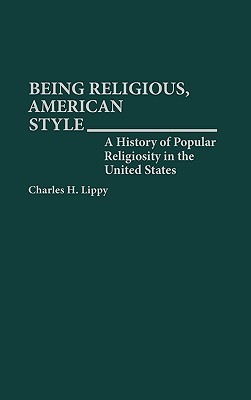
Popular religiosity is a phenomenon of every culture. Popular religiosity is the personal, informal expressions of religious belief that flourish outside the structures of formal belief. And these have played an important role in American religious history, according to Charles H. Lippy[1] in Being Religious, American Style: A History of Popular Religiosity in the United States.
From the Puritans in New England to African American slaves in the south to contemporary charismatic movements and “New Spirituality” expressions, individuals have sought an immediate, personal encounter with the supernatural, apart from religious structures. For Lippy, this accounts both for the vitality and the privatization of belief among Americans.
I would agree and suggest that for churches and other religious bodies to thrive, they need to foster this connection with the supernatural. Sadly, the trend in many theological circles is toward the de-supernaturalization of the church, a bifurcation between sacred and secular. What seems necessary is for churches to recover the sense of the presence of the Living God. What churches also offer are formative communities that can channel and discipline personal expressions of spirituality, and through the lived experience of their own communal life in the world, can equip their members for a more constructive engagement of the wider public world. The predominance of personal, idiosyncratic expression coupled with weak communal life and a weak theology of the Sovereignty of God in all of life leaves people ill-equipped for public engagement. Their only resources are experience and moralism — thin fare for engaging the public world.
————–
Note to the reader: The Emerging Scholars Network (ESN) continues to encourage those who have read the book “under review” to comment. In addition, we acknowledge that some who have not read the book “under review,” also bring helpful insights to the concepts/data explored in a given book, the writing of a particular author, and/or the understanding of the concepts/data as offered by the reviewer. As such we are open to “civil” on-topic comments from both those who have read and those who have not read the book “under review.”
Deep down ESN longs for reviews such as those offered by Bob not only to foster dialogue, but also to serve as teasers — providing an opportunity for our readers to discern what books to place in their personal and book discussion group queue. If you have books you desire to review and/or to have reviewed by ESN, please email ESN.
Notes
- Charles H. Lippy is the LeRoy A. Martin Distinguished Professor of Religious Studies Emeritus, University of Tennessee at Chattanooga. A past president of the American Society of Church History. ↩
Bob Trube is Associate Director of Faculty Ministry and Director of the Emerging Scholars Network. He blogs on books regularly at bobonbooks.com. He resides in Columbus, Ohio, with Marilyn and enjoys reading, gardening, choral singing, and plein air painting.

Leave a Reply